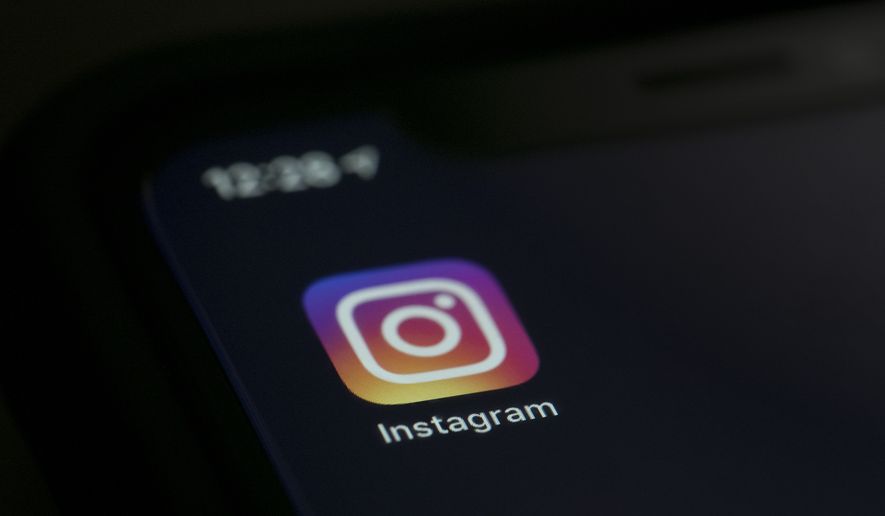Facebook halted an Instagram product for children Monday as the tech giant braced for a confrontation with Congress over allegations Instagram hurts girls’ mental health and possibly contributes to suicidal thoughts.
Sens. Richard Blumenthal, Connecticut Democrat, and Marsha Blackburn, Tennessee Republican, took aim at the Facebook-owned Instagram and intend to grill a Facebook executive at a hearing Thursday on the image-sharing platforms’ impact on mental health, especially for teenage girls.
Facebook attempted to blunt its critics’ sharpest attacks by pausing the development of “Instagram Kids” and confronting its detractors online. Instagram Kids, which was still in the development stages, was planned as a version of the popular social media platform that would target children under age 13. Instagram head Adam Mosseri said Monday the company was pausing its plans.
“While we stand by the need to develop this experience, we’ve decided to pause this project,” said Mr. Mosseri on Instagram’s blog. “This will give us time to work with parents, experts, policymakers and regulators, to listen to their concerns, and to demonstrate the value and importance of this project for younger teens online today.”
The announcement comes amid a crush of bad publicity for Facebook spurred by news reports of internal research allegedly showing Instagram harming children’s mental health. Earlier this month, the Wall Street Journal accused Facebook of knowing Instagram is “toxic for teen girls” based on internal company research.
The internal documents included findings that 32% of teenage girls said Instagram made them have a worse body image. The company also found that among teenagers in the survey who considered suicide, 13% of British teens and 6% of American teens directly linked suicidal thoughts to Instagram.
Following the newspaper’s report, Mr. Blumenthal and Ms. Blackburn scheduled a hearing to probe the alleged problems facing children using Instagram and Facebook.
“The platform was fully aware that Facebook had serious and harmful issues,” Ms. Blackburn said in a statement last week. “Young girls’ risk of suicide increased, human trafficking thrived on the site, and cartels gloated about their killings.”
Since federal lawmakers jumped into the scrum, Facebook started punching back with statements online. Facebook Vice President Pratiti Raychoudhury, the head of research at the company, published a blog post accusing critics of mischaracterizing the internal analysis of its products’ effect on kids.
“It is simply not accurate that this research demonstrates Instagram is ’toxic’ for teen girls,” wrote Ms. Raychoudhury. “The research actually demonstrated that many teens we heard from feel that using Instagram helps them when they are struggling with the kinds of hard moments and issues teenagers have always faced.”
She also sought to refute The Journal’s assertions that Facebook knowingly harms kids, saying the internal research aimed to prevent harm.
“Our internal research is part of our effort to minimize the bad on our platforms and maximize the good,” Ms. Raychoudhury said. “We invest in this research to proactively identify where we can improve — which is why the worst possible results are highlighted in the internal slides.”
When critics replied on Twitter that Facebook ought to make its research public, the company answered that it was working on doing so.
“We’re sharing these slide decks with Congress in advance of the hearing this week and we’re evaluating how we can release it to the public at some point,” said Facebook spokesperson Andy Stone on Twitter.
Facebook’s decision to make changes in advance of Thursday’s hearing won lukewarm praise on Monday from fierce critics. For example, Ms. Blackburn called the move to pause Instagram Kids a “step in the right direction” but she said the company needs to do more and Congress needs to hold large technology companies accountable.
Similarly, the National Center on Sexual Exploitation offered only tepid approval of Facebook’s suspension of Instagram Kids.
“While we are glad Facebook paused its plans to introduce this app for kids, it needs to completely cancel this project,” said Lina Nealon, National Center on Sexual Exploitation director of corporate and strategic initiatives, in a statement. “Facebook must put children’s health and safety before their bottom line.”
Facebook global head of safety Antigone Davis is scheduled to testify before Mr. Blumenthal and Ms. Blackburn at the consumer protection, product safety, and data security panel within the Senate Commerce Committee on Thursday. Other companies have committed to testifying in future hearings, according to Mr. Blumenthal.
• Ryan Lovelace can be reached at rlovelace@washingtontimes.com.




Please read our comment policy before commenting.